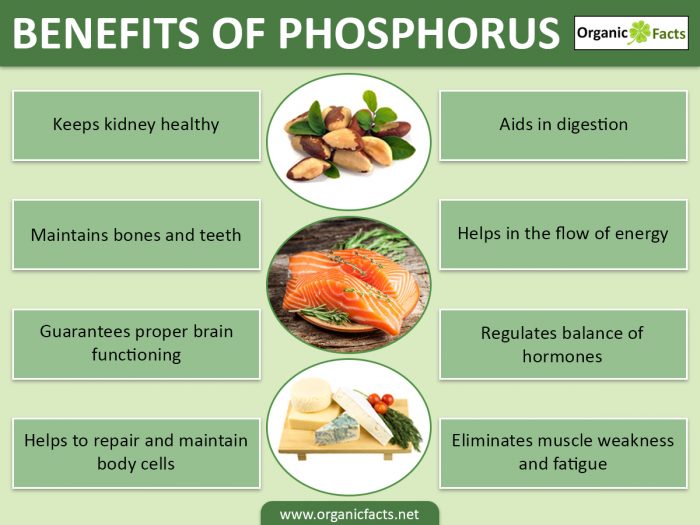The health benefits of phosphorus include healthy bone formation, improved digestion, regulated excretion, protein formation, and hormonal balance. It also ensures improved energy extraction, cellular repair, optimized chemical reactions, and proper nutrient utilization. These benefits of phosphorous make it an important constituent of any diet.
What is Phosphorus?
Phosphorus is an important constituent of human bones, meaning that it would be impossible for the body to function normally without an adequate amount of this mineral. In fact, phosphorus is regularly noted as the second-most profuse mineral in the human body and is the second-most important element when it comes to maintaining bone health and integrity, behind calcium. Other health benefits of phosphorus are vital for performing essential activities for different body parts like the brain, kidney, heart, and blood. It is an essential part of our diet, particularly as children, when the most growth and development occurs. [1]
Sometimes phosphorus is confused with phosphate. In reality, they are two different things. Phosphorus is an element. A phosphate is a salt containing phosphorus.
Important Sources of Phosphorus
Most protein-rich foods are a good source of phosphorus too, but some non-protein foods also contain phosphorus. Here is a list of foods high in phosphorus:
- Protein-rich, phosphorus-rich foods: meat, nuts, legumes, seeds, eggs, peanut butter, tuna, pork, and dairy products.
- Non-protein, phosphorus-rich foods: whole grains, garlic, potato, broccoli, dried fruits, and soda beverages.
Health Benefits of Phosphorus
Let us see how phosphorus benefits our entire body in detail:

Phosphorus is a mineral that makes up 1% of a person’s total body weight. Photo Credit: Shutterstock
Strengthens Bone and Teeth
Phosphorus is a vital part of the growth process, as well as the maintenance of bones and teeth. It works in association with calcium to create strong bones, which can withstand the normal wear and tear of human life. It also helps in boosting the health of your gums and tooth enamel. It helps in relieving serious problems like bone loss or the loss of mineral density, also known as osteoporosis. This mineral lays the foundation of a strong skeletal structure to ensure a healthy and functional living. One of the recent discoveries of phosphorous also links it to heart health, meaning that with a proper intake, you can better protect yourself from a range of cardiovascular diseases. [2] [3]
Boosts Digestion
Phosphorus plays an important role in facilitating effective digestion in the human body. It does this by stimulating the digestion of riboflavin and niacin in an efficient way. These two varieties of vitamin B are responsible for everything from energy metabolism to neurological and emotional response systems. [4]
Detoxification
Phosphorus plays an important role in keeping the kidneys healthy. It does this by ensuring the proper release of waste from kidneys through the process of urination and excretion. By increasing the quantity and frequency of urination, the body is able to balance its levels of uric acid, excess salts, water, and even fat, since urine is usually about 4% fat. Phosphorous encourages the healthy balance of all fluids and materials that are eliminated from the body, thereby helping the entire body remain healthy and toxin-free. [5]
Reduces Weakness
Phosphorous has the ability to remove minor health problems like muscle weakness, numbness, fatigue and similar ailments. Normal levels of phosphorous in the body are a great way to remain fit and active. Sexual weakness can also be cured with healthy supplementation of phosphorous into the body, so issues like loss of libido, frigidity, impotence, and sperm motility can be boosted by having an adequate supply of phosphorus in your system. [6]
Supports Cognitive Development
Since phosphorous is an essential element found around as well as inside the cells of the brain, it is obviously responsible for important functions. Proper levels of phosphorous guarantee proper brain function and cognitive growth and development. Studies have linked a phosphorus deficiency to an increased risk of cognitive malfunction, and the early onset of neurological conditions. [7]
Stimulates Protein Metabolism
Phosphorus is one of the most important elements in the creation of proteins, which further help in the process of reproduction. It also facilitates the maximum utilization of proteins in the human body to ensure proper growth of cells, along with their repair when necessary. In the same manner, phosphorus also helps our bodies utilize carbohydrates as well as fats. The metabolism of proteins is what keeps our body growing and maintaining itself as the wear and tear of the years continues. It is one of the essential parts of human metabolism, so phosphorus’ stimulating effect is vital to our overall health.
Boosts Cell Repair
Phosphorus is a very important element in the structure of DNA, which is present in the nucleus of the majority of cells in the body. Thus, it is very the mineral is highly important during pregnancy. Phosphorus also contributes to the repair process and maintenance of various body cells which suffer from daily wear and tear. It ensures that body cells are developed properly and remain active for impressive overall health. This contribution mainly comes in the form of helping to create protein and stimulating the correct hormones to react accordingly around the body to stimulate metabolic activity. [8] [9]

Phosporus helps to keep your bones healthy. Photo Credit: Shutterstock
Ensures Hormonal Balance
The health benefits of phosphorus may be considered vital for regulating the balance of hormones in the human body. It ensures that hormones, especially those required for good reproductive health, are always present in relevant and balanced amounts. Phosphorus does this by directly interacting with the endocrine glands of the body and helps to regulate the creation and release of hormones. The hundreds of hormones in our body play extremely important roles in all of our health issues, and phosphorus is an irreplaceable part of that control system. [10]
Promotes Metabolism
Phosphorus aids in the process of energy extraction by stimulating the process of metabolism of different nutrients. Furthermore, it helps in the flow of energy and its efficient usage by different organ systems, some of which is due to its ability to absorb vitamins so efficiently.
Facilitates Nutrient Uptake
Phosphorus acts as a participant or co-factor in a number of chemical reactions taking place inside the body. Also, it facilitates the proper utilization of various nutrients entering the body. All in all, be sure to always include phosphorus in your diet, you won’t get far without it! [11]
Uses of phosphorus
- Laxatives: Phosphate, the salt of phosphorus, is used as a laxative in enemas
- Plant fertilizers: Phosphorus compounds are used in fertilizers and pesticides. It is one of the most important elements for plants.
- Manufacturing: It is also an important ingredient in the manufacturing of special glasses, detergents, and chinaware. Red phosphorus is used in the manufacturing of matchsticks and matchboxes.
Recommended Phosphorus Intake
The recommended daily intake of phosphorous as directed by National Institutes of Health is 460 to 500 mg/day for children and 700 to 1250 mg/day for adults. However, if you plan to add a phosphorus (or phosphate) supplement to your diet, it is recommended to speak with medical professionals or nutritionists who can better explain your dietary needs. [12]
Side Effects
Although there have not been many cases of phosphorus allergies, it may have side-effects in certain cases as below:
Too much Phosphorus can cause
- Hyperphosphatemia which causes joint and muscle pain
- Vitamin D absorption issues
- Impacts renal health
- Hardens organs and tissues
- Diarrhea
Too less Phosphorus can cause
- Weak bones
- Loss of appetite
- Numbness
- Anxiety
- Tremors
- Weight loss
- Stunted growth
Phosphorus also interacts with certain medication causing a phosphorus level imbalance in the body. Therefore, when on medication, it is important to consult your doctor before adding it to your diet.
